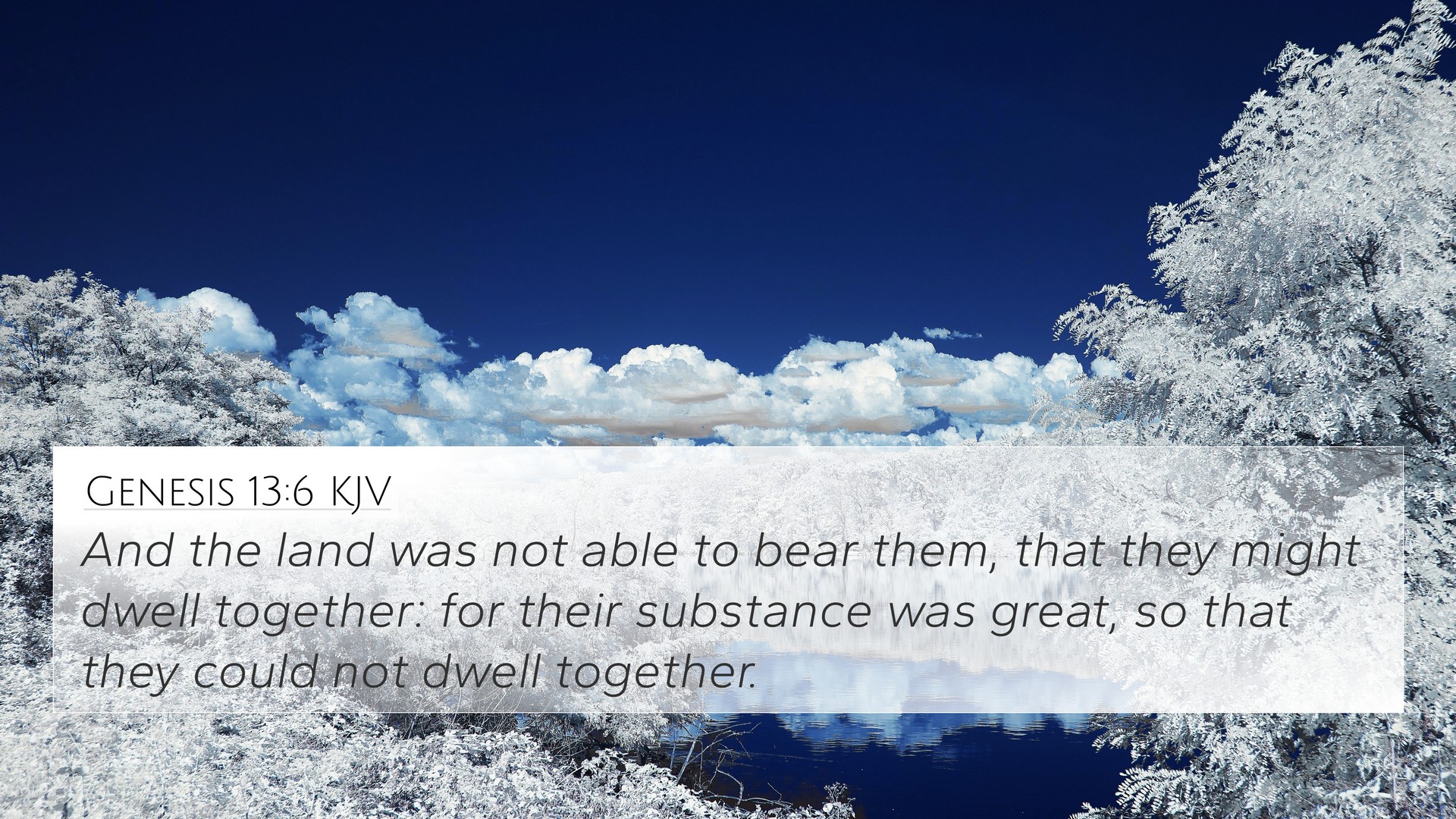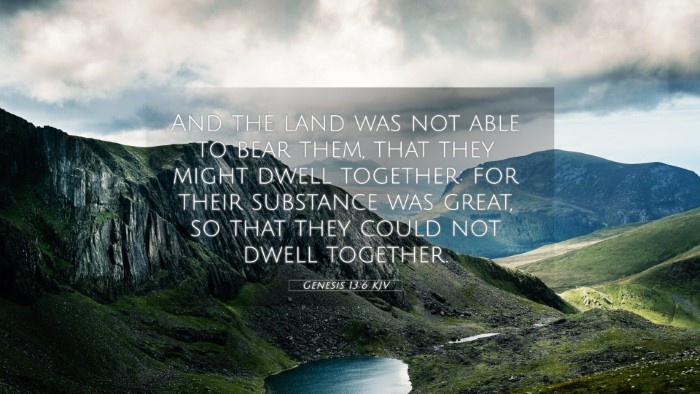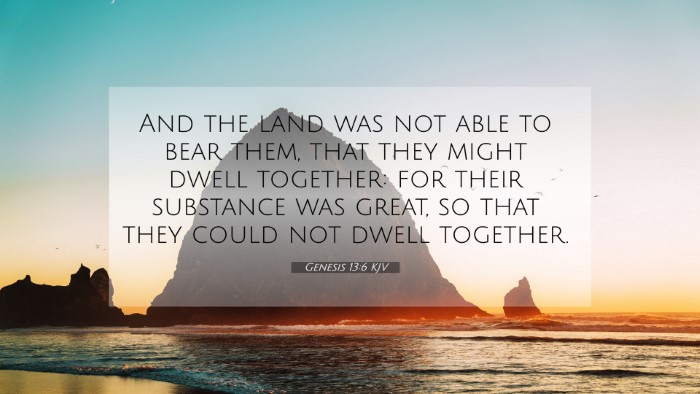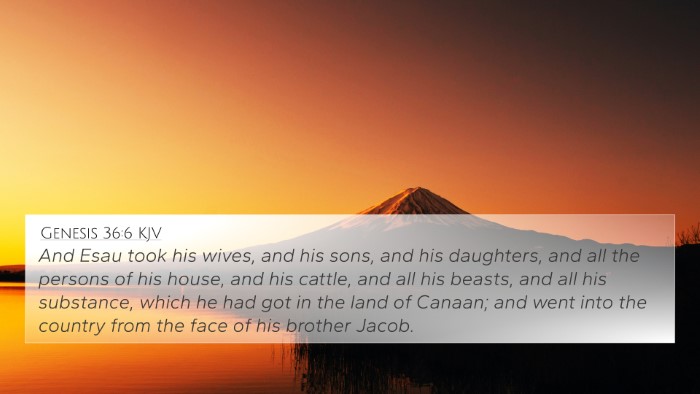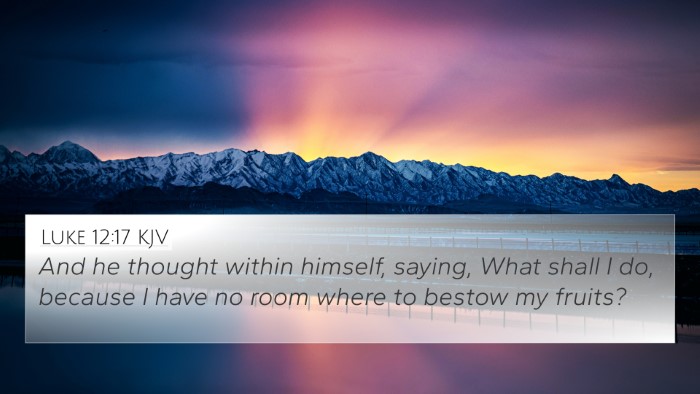Understanding Genesis 13:6
Bible Verse: Genesis 13:6
"And the land was not able to bear them, that they might dwell together: for their substance was great, so that they could not dwell together."
Summary of Meaning
The verse highlights a key moment in the narrative of Abram and Lot, illustrating the challenges that arise when substantial blessings lead to conflict. As their wealth grew, so did the tension between them, indicating that abundance can sometimes create division if not managed prudently.
Commentary Insights
- Matthew Henry: Henry notes that the strife between Abram and Lot arose because of their great possessions. He emphasizes the importance of harmony and unity over material wealth and warns against letting riches cause discord among family.
- Albert Barnes: Barnes explains that the land's inability to support both households reflects the physical limitations in the environment, and this serves as a metaphor for the limits that can exist in various relationships. He calls attention to how this division was necessary to preserve the peace.
- Adam Clarke: Clarke discusses the implications of this discord, suggesting that conflict can arise even among those who are related when they both strive for the same resources. He highlights the importance of choosing peace and separation over strife.
Cross-References
This verse connects with several other Biblical passages that reflect similar themes of conflict, abundance, and God's providential guidance:
- Genesis 34:30: Jacob expresses concern over the potential conflicts among his family, illustrating the theme of family strife.
- Proverbs 17:1: "Better is a dry morsel, and quietness therewith, than a house full of sacrifices with strife." This proverb reiterates the value of peace over wealth.
- Luke 12:15: Jesus warns about covetousness and the dangers of greed, paralleling the issues faced by Abram and Lot.
- James 4:1-2: This passage addresses the root of conflicts, which can arise from desires that lead to harm, similar to the greed witnessed between Abram and Lot.
- 1 Corinthians 3:3: Paul highlights strife among believers, underlining that such divisions can arise from worldly concerns, much like the household of Abram and Lot.
- Philippians 2:3-4: An exhortation to value others above oneself, reflecting the need for humility in relational struggles.
- Matthew 5:9: "Blessed are the peacemakers: for they shall be called the children of God." This beatitude reinforces the importance of seeking peace, relevant to Abram’s eventual choice to separate from Lot.
Thematic Connections
Genesis 13:6 is not only pivotal in the story of Abram and Lot, but it also invites broader reflections on:
- The nature of wealth: Wealth can serve as both a blessing and a source of conflict.
- Family dynamics: The management of relationships amid abundance is a recurring theme in scripture.
- God's providence: Trusting God to provide for our needs, as demonstrated by Lot's eventual choice in land.
Tools for Cross-Referencing
To deepen one's understanding of connections between Bible verses, various tools can assist:
- Bible Concordance: A comprehensive listing of words in the Bible that helps locate relevant verses.
- Bible Cross-Reference Guide: A resource for finding related scripture verses based on themes and keywords.
- Cross-Reference Bible Study: A method that encourages exploring related passages for deeper insights.
- Bible Chain References: A sequence of scriptures linked by common themes that can enhance verse study.
How to Use Cross-References in Bible Study
Implementing cross-references can illuminate the richness of scripture. Here are some tips:
- Start with a Bible verse that resonates with you.
- Use a concordance or a study Bible to find related verses.
- Group together verses on similar themes or subjects, facilitating comparative analysis.
- Reflect on the connections and insights you gain, noting how they contribute to your overall understanding of the text.
Conclusion
Genesis 13:6 serves as a poignant reminder of the complexities that arise in relationships, especially when material wealth is involved. By exploring this verse through various commentaries and cross-references, we uncover themes of unity, conflict, and the overarching call to peace. Engaging with scripture in this way not only enriches our biblical understanding but also aids in practical application in our everyday lives.
